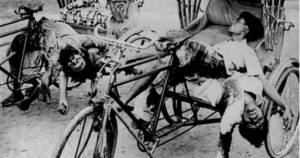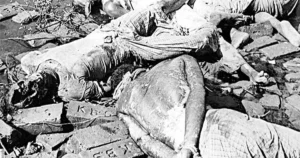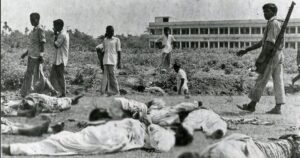March 25th, 1971, is etched in the history of Bangladesh as a day of unimaginable horror and immense significance. On this night, the Pakistani military launched a brutal crackdown on the unarmed Bengali population in East Pakistan, an event that became the catalyst for the Bangladesh Liberation War. Known as “Operation Searchlight,” the atrocities committed on March 25th marked the beginning of a nine-month-long struggle for independence, leading to the birth of Bangladesh on December 16th, 1971.
March 25th, 1971
The Prelude to March 25th
The roots of the conflict that culminated on March 25th can be traced back to the deep-seated political, economic, and cultural disparities between East and West Pakistan. Since the creation of Pakistan in 1947, the people of East Pakistan (now Bangladesh) had been subjected to systematic discrimination and exploitation by the ruling elite in West Pakistan. Despite constituting the majority of Pakistan’s population, the Bengalis were marginalized in terms of political power, economic resources, and cultural recognition.
The situation reached a tipping point in 1970, when the Awami League, under the leadership of Sheikh Mujibur Rahman, won a landslide victory in the general elections. The party secured 167 out of 169 seats allocated to East Pakistan in the National Assembly, giving it a clear majority. However, the ruling authorities in West Pakistan, led by President Yahya Khan and the Pakistan People’s Party (PPP) leader Zulfikar Ali Bhutto, refused to transfer power to the Awami League. The refusal to honor the electoral mandate sparked widespread protests and demands for autonomy in East Pakistan.
As tensions escalated, Sheikh Mujibur Rahman called for non-cooperation and civil disobedience, effectively paralyzing the administration in East Pakistan. On March 7th, 1971, in a historic speech at the Racecourse Ground in Dhaka, Sheikh Mujib declared, “The struggle this time is a struggle for our emancipation. The struggle this time is a struggle for independence.” The people of East Pakistan were ready for a showdown, but few anticipated the scale of brutality that would soon be unleashed.

Operation Searchlight: The Night of Genocide
On the night of March 25th, 1971, the Pakistani military launched Operation Searchlight, a meticulously planned and ruthless military operation aimed at crushing the Bengali nationalist movement. The operation was designed to decimate the leadership of the Awami League, eliminate intellectuals and students, and terrorize the population into submission.
As night fell, the Pakistani army, equipped with tanks, artillery, and machine guns, stormed the streets of Dhaka. Their first targets were the dormitories of Dhaka University, where students were shot dead in their sleep, and faculty members were brutally killed. The Jagannath Hall, a residence for Hindu students, was particularly targeted, and hundreds of students were massacred. The brutality was not limited to the university; residential areas such as Rajarbagh, Pilkhana, and Old Dhaka also bore the brunt of the assault. Thousands of civilians, including women and children, were killed indiscriminately.
The Dhaka University massacre was just the beginning. The military operation quickly spread to other parts of East Pakistan. Cities like Chittagong, Khulna, and Rajshahi witnessed similar atrocities. The Pakistani military systematically targeted Hindus, intellectuals, journalists, and anyone suspected of supporting the independence movement. The scale of the violence was staggering, with reports of mass killings, rapes, and arson. The exact number of casualties on the night of March 25th remains unknown, but estimates suggest that several thousand people were killed in Dhaka alone.

The Aftermath: A Nation Rises
The atrocities committed on March 25th did not achieve the intended objective of subduing the Bengali population. Instead, it galvanized the people of East Pakistan to rise up in a full-scale liberation war. The brutality of Operation Searchlight shocked the conscience of the international community and exposed the genocidal intentions of the Pakistani military regime.
On the morning of March 26th, 1971, Sheikh Mujibur Rahman declared the independence of Bangladesh in a message that was broadcast across the country. Although he was arrested and taken to West Pakistan, his declaration became the rallying cry for the liberation movement. The Mukti Bahini, or the Liberation Army, was formed, consisting of Bengali military personnel, students, and civilians who took up arms to fight for their freedom.
The nine-month-long war that followed was marked by immense suffering and sacrifice. The Pakistani military, with the support of local collaborators known as Razakars, continued its campaign of terror, resulting in the deaths of an estimated 3 million people and the displacement of millions more. The systematic use of rape as a weapon of war left deep scars on the Bengali society, with hundreds of thousands of women becoming victims of sexual violence.
Despite the overwhelming odds, the people of Bangladesh, with the support of the Indian government and military, persevered in their struggle. On December 16th, 1971, the Pakistani military surrendered to the joint forces of the Mukti Bahini and the Indian army, marking the end of the war and the birth of Bangladesh as an independent nation.

The Legacy of March 25th
March 25th, 1971, is remembered as one of the darkest days in the history of Bangladesh. It is a day that symbolizes the immense pain and suffering endured by the people of Bangladesh in their quest for freedom. The atrocities committed on that night have been recognized by many as acts of genocide, and efforts continue to seek justice for the victims and hold the perpetrators accountable.
Every year, Bangladesh observes March 25th as “Genocide Day” to commemorate the victims of Operation Searchlight and to remind the world of the horrors of that night. The day serves as a solemn reminder of the resilience and courage of the Bengali people, who, despite facing unimaginable brutality, never wavered in their determination to achieve independence.
The legacy of March 25th also underscores the importance of safeguarding human rights and preventing such atrocities from occurring again. The memory of the victims of March 25th, 1971, continues to inspire the people of Bangladesh to uphold the values of justice, freedom, and democracy.
March 25th, 1971, was a turning point in the history of Bangladesh. The night of terror unleashed by the Pakistani military was meant to crush the spirit of the Bengali people, but it had the opposite effect. It ignited a fire of resistance and determination that ultimately led to the creation of an independent Bangladesh. The sacrifices made on that night and throughout the liberation war are deeply ingrained in the national consciousness and continue to shape the identity and values of Bangladesh as a nation committed to justice, freedom, and human dignity.
See More:
